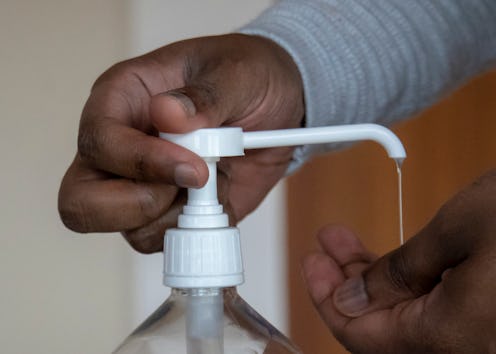Life
Why Experts Are Saying You Shouldn't Make Your Own Hand Sanitiser

Coronavirus has quickly become a very real global health threat, leading many people to stock up on products such as hand sanitiser to protect themselves from the spread of germs. However, with a supply shortage happening in a number of countries across the globe, many people are now wondering whether at-home hand sanitisers are the solution. But is making a DIY formula a good idea?
For the past few days, at-home hand sanitiser recipes have begun to spring up around the internet, usually suggesting a mixture of alcohol and aloe vera, among a few other ingredients (tea tree oil, for example).
The World Health Organisation does have its own guide to making hand sanitiser, but this is intended for populations that don't have access to clean water, soap, or other medical-grade products to help protect against the spread of germs.
On March 3, Public Health England (PHE) confirmed with HuffPost UK that it is not recommending people make their own at-home hand gels. Although PHE did not share their reasoning behind this, it's likely to do with the fact that there's little evidence to suggest at-home gels actually work in the fight against viruses, as HuffPost points out. On top of that, Wired's Science Editor Matt Reynolds notes: "At best, it’ll probably be less effective than high-street versions and at worse you could end up severely damaging your skin."
Speaking to Sky News, Professor Robert Dingwall, a public health expert from Nottingham Trent University, pointed out another potential safety risk that could occur if the wrong concentration of alcohol is used when making hand sanitiser. "There is also a risk you put it on and then turn on a gas tap and then your hand goes up like a Christmas pudding," he said.
When it comes to stopping the spread of coronavirus, the preferable way to wash your hands is to use soap and warm water, as recommended in the UK government's Coronavirus Action Plan. You should do this when you get to work or arrive home, after you blow your nose, cough or sneeze, and before you eat or handle food. Make sure you wash them for at least 20 seconds, gov.uk recommends.
Read more here:
What's Happening With Coronavirus In The UK?
The Major Events Cancelled Due To Coronavirus
8 Myths About Coronavirus, Debunked
If you or someone you’ve been in close contact with appears to have shown or be showing symptoms of coronavirus, which include fever, shortness of breath, and coughing, visit the NHS website in the UK to find out the next steps you should take or visit the CDC website in the U.S. for up-to-date information and resources. You can find all Bustle’s coverage of coronavirus here, and UK-specific updates on coronavirus here.